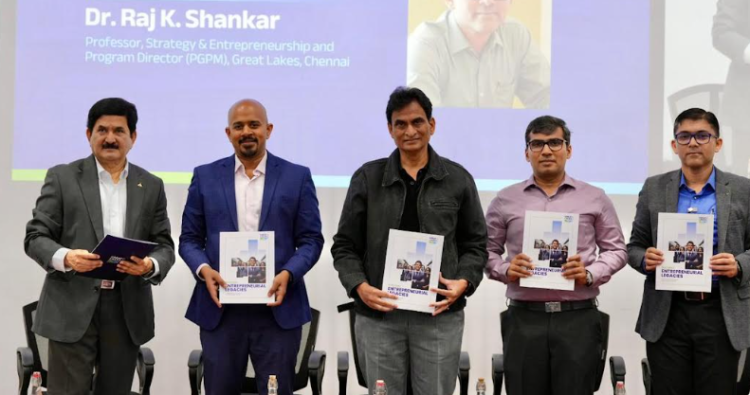Chennai, October 9, 2025: A new report released by Great Lakes Institute of Management, Chennai “Building Entrepreneurial Legacies: Understanding the Role of Family Offices”, reveals that family-owned businesses contribute to nearly 70% of India’s GDP and over 60% of national employment, underscoring their indispensable role in India’s economic growth story.

The report was unveiled at the Family Business Conclave 2025, jointly hosted by Great Lakes Institute of Management and the Madras Management Association (MMA), on the theme “Creating Entrepreneurial Families – The Role of Family Offices.”
The study, authored by Dr Raj Krishnan Shankar, Professor of Strategy & Entrepreneurship at Great Lakes, highlights how family offices are emerging as critical enablers for governance, legacy planning, and intergenerational entrepreneurship. With India witnessing a rapid rise in private wealth and generational transitions, family offices are increasingly becoming the nerve centres that balance tradition with transformation.
Key findings from the report include:
- Family-owned businesses contribute 70% of India’s GDP, with projections suggesting this could rise to 80–85% by 2047.
- Family enterprises account for over 60% of national employment, particularly within MSMEs.
- India’s top 300 business families hold a combined net worth of ₹134 lakh crore (US$1.6 trillion), employing over two million people.
- The number of organised family offices in India could cross 1,000 by the next decade, reflecting the increasing need for structured wealth and succession management.
Said Dr Raj Krishnan Shankar, Lead Author of the report and Professor of Strategy & Entrepreneurship at Great Lakes Institute of Management: “Family businesses are the invisible backbone of India’s economy. They don’t just create wealth, they create continuity. As India’s business families collectively manage over a trillion dollars in private wealth, the real challenge is no longer growth, but governance. That’s where family offices come in, as strategic engines that preserve values, professionalise decision-making, and ensure that entrepreneurship doesn’t fade with succession but strengthens through it.”
The conclave featured Mr C.K. Ranganathan, Chairman & Managing Director, CavinKare, who delivered a powerful keynote address on creating entrepreneurial legacies. Drawing from his own experience, he emphasised that meritocracy must triumph over hierarchy in family-run businesses and that the value of money must be deeply understood, not merely enjoyed.
Said Mr C.K Ranganathan: “Money is a responsibility, not just a privilege.” He added: “Business acumen is about common sense, emotional intelligence, and sound math. Success matters, but learning matters more, because when families handhold too much, they take away the opportunity to learn. The real mantra is simple: fail fast, fail cheap, and keep learning.”
The conclave also hosted dynamic discussions with leaders from Mehta Hospitals, TSM Group, Sargam Metals, and Maya Appliances, among others, who shared their perspectives on succession planning, governance frameworks, and preparing the next generation to lead with purpose and accountability.
Said Sam Mehta, Director of Mehta Hospitals, sharing his perspective on evolving family business structures: “A family business is about stewardship, not just ownership. A family office isn’t a luxury; it’s a necessity for structure and longevity. You must prove yourself outside the family name, bring that experience back, and earn credibility as both an entrepreneur and an investor.”
Said Yash Merchant, Director – Brand Marketing & Alumni Relations, Great Lakes Institute of Management, in closing remarks: “At Great Lakes, we are building a community of family business owners and next-gen leaders through research, dialogue, and education. The goal is to help families professionalise, innovate, and stay entrepreneurial across generations.”
The event featured the launch of the Great Lakes Insight Dossier and engaging discussions on succession planning, family constitutions, and the evolving role of the next generation in business leadership.

